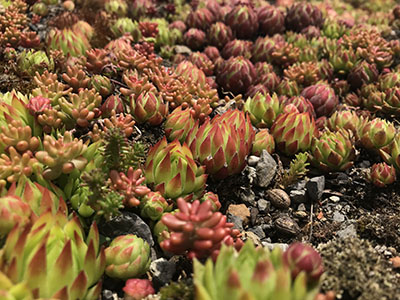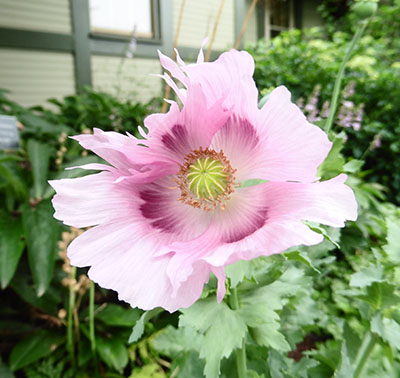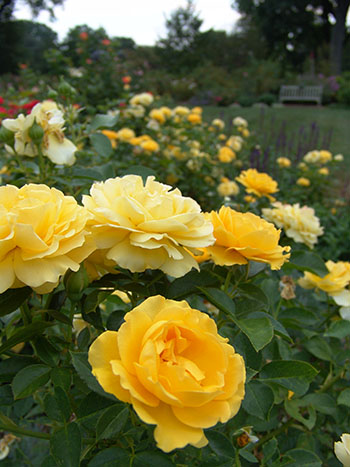
Plant of the Week: June 25

By Erin Fogarty, 2018 Summer Intern
Jovibarba spp.
Succulents are easy to care for and perfect for windowsills. They are a great choice for even the smallest space. Here at the Scott Arboretum, a certain succulent, Jovibarba spp, Jupiter’s beard, is finding its home on the green roofs of the Alice Paul and David Kemp Residence Halls.
Jovibarba spp. is perfect for this difficult-to-access location. As a native of the mountainous Carpathian region, it can withstand our difficult winters that would kill most other succulents. It is also able to tolerate light foot traffic, cutting down on maintenance.
Jovibarba is similar to its hens-and-chicks (Sempervivum spp.) cousin, growing multiple smaller “pups” off the main blooms in bright green and burgundy. These plants need good drainage and not much watering. Whether you want to liven up your spacious patio or add a new plant to your windowsill collection, Jovibarba is a great choice. Photo Credit: E. Fogarty

Papaver somniferum
Looking at the delicate bicolor petals and pale green leaves of Papaver somniferum, it is easy to see why this plant has been prized for thousands of years (literally – images of this plant have been found on 6,000 year old Sumerian pottery!)
Since the ancient Greeks, people have recognized opium poppy for its “medicinal properties”. Mentioned in Homer’s Odyssey, it was used it to treat bad eyesight, stomach ailments, asthma, and nervous complaints. The poppy launched Great Britain and China into not one but two wars, and was later used to create the “opiate” family of illicit drugs.
Although anyone is welcome to grow these flowers for aesthetic enjoyment, it is illegal to produce them in mass quantities. In fact as a result of the DEA investigation of Thomas Jefferson’s Monticello in the 1990s, they no longer sell poppy seeds in their gift shop.
When planting poppies, note that they do not take well to being transplanted. It is best to scatter seeds on the soil in your garden in early spring, then let them sprout where they fall. Poppies prefer adequate drainage and plenty of light. Enjoy looking at these beautiful blooms around the Cunningham House while you can – although the seed pods last until fall, the petals only appear for a few days. Photo Credit: E. Fogarty

Rosa [Julia ChildTM ] ‘WEKvossutono’
Julia Child was one of America’s best French chefs, so it is only fitting that one of the best varieties of garden roses is her namesake. A relatively new variety released in 2006 as a cross of four roses, Rosa [Julia ChildTM ] ‘WEKvossutono’ is remarkably resistant to heat stress, black spot, and mildew. With its compact size of 30” tall and wide, and its multitudinous flowers that bloom all summer, this rose has quickly become a favorite of home gardeners.
Reportedly, Julia Child, who was very resistant to giving her name to any commercial product, saw the rose while it was still an unnamed test subject in the garden of one of her producers. She fell in love with the flower’s buttery yellow blossoms and clove-like scent. Julia Child then consented to the rose being named after her.
Unfortunately, Julia Child died two years before the rose went to market. Surely, she would be proud of how the rose bearing her name has made rose cultivation approachable for amateur gardeners, just as she made French cuisine approachable to home chefs. Photo credit: R. Robert





Wendy C
Posted at 18:01h, 28 JuneThat rose is very beautiful, will try and find it at my local nursery. Thank you for the very informative posts.
Lynn Etheredge
Posted at 18:36h, 28 JuneBecky – Thanks for the Julia Child rose. It looks great. Just found it on Amazon from Proven
Winners & put in an order. Lynn
Diane Mattis
Posted at 23:13h, 28 JuneThat poppy is exquisitely beautiful!
Becky Robert
Posted at 13:07h, 10 JulyThank you all for the great feedback. I will pass your praise along to summer intern, Erin.
Sincerely,
Becky
PR and Volunteer Programs Coordinator